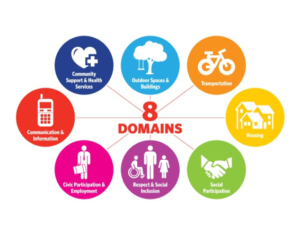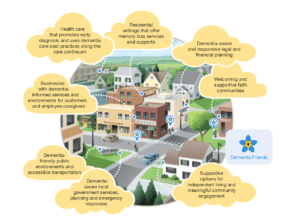Thursday, October 10, 2019
Embed from Getty Images
It started out as an ordinary day for Jim, a 70 year old man living in his own house in downtown Vancouver. He went out to buy his morning paper as he does every morning, from the shop around the corner. When he got to the register and pulled his spare change from his pocket, however, Jim suddenly couldn’t wrap his brain around the coins. Which ones did he need? What were these coins in his hand? Finally, in frustration, he set all the coins in his hand down on the counter. Jim has Alzheimer’s disease. He’s in good physical health and is mostly independent at navigating the community. But some days, things that are usually easy for Jim suddenly mystify him. Thankfully, the shop cashier knows Jim and has been to a Dementia Friendly community training so she’s familiar with the signs and challenges of Alzheimer’s and other dementias. Without batting an eye, she counted out the change for Jim, gave him the newspaper and asked him what his plans were for the day before sending him on his way, assured that he knew how to get home. [To see the whole story of Jim’s journey, check out this video.]
Embed from Getty Images
Jim is lucky to live in a community that has embraced the idea of including people with Alzheimer’s and other dementias. In Illinois, over 220 thousand people are living with dementia due to Alzheimer’s disease and related disorders. Another 588 thousand Illinois residents are impacted by dementia as informal caregivers. Just like Jim, every one of these people has to navigate their community and access public spaces. When it’s challenging to access these spaces, people become socially isolated and have trouble living in their own homes in the community. Not only that, but Jim is a volunteer and dedicates much of his week to helping make his community a better place. It could be said that without him and the cadre of other older adult volunteers living in and serving the community, we would all be missing out.
Leading the Challenge in Illinois
In response to this challenge, the Agency on Aging Northeastern Illinois is taking a leadership role with the Metropolitan Mayor’s Caucus’ Age-Friendly Communities Collaborative. In collaboration with other non-profits and community leaders, we’re working toward the goal of supporting older adults and people like Jim, who struggle with dementia but who want to remain in their own homes and communities. We recognize that inclusive, supportive infrastructure and design is good for everyone and we want to help more Illinois’ cities, towns, counties, and communities embrace this age- and dementia-friendly movement.

What Makes a Community Age-Friendly?
AARP identified specific things that qualify communities for the official designation as an “Age-Friendly” city or town. Embracing an age-friendly goal helps communities focus on specific criteria of livability, established by the World Health Organization as critical to quality of life for everyone, young and old. The 8 Domains of Livability cover everything from outdoor spaces and public places, to housing, work, and transportation.
Age-friendly communities are free from physical and social barriers and supported by policies, systems, services, products and technologies that promote health and build and maintain physical and mental capacity across the life course.
Age-friendly communities enable people, even when experiencing physical or mental challenges, to continue to do the things they value in the communities they know and love. For most people, this is the ideal way to “age well.” Specific things that support this kind of environment include:
- Workplaces that are adapted to meet the needs of people with disabilities
- Pavements that are wide, well-maintained, and nonslip
- Housing that is plentiful, affordable and available to all older people
- Events that are convenient and accessible to older people
- Community decision-making processes that include older people as full partners
For more age-friendly practices click here.

What Makes a Community Dementia-Friendly?
Beyond being age-friendly, communities also need to work on accessibility for those with Alzheimer’s and other dementias. Dementia-friendly work is a critical element of the broader age-friendly framework. The Dementia Friendly America (DFA) initiative helps communities better engage and support people living with dementia and their caregivers. The mission is to create dementia-friendly communities where people of all ages can live, age, and thrive. Promoting awareness of dementia and educating people on how to best support those touched by dementia introduces systematic changes within businesses, governments, and neighborhoods. The Agency on Aging is leading the State in assisting our region’s communities in becoming dementia friendly. Currently, 5 out of 8 of the communities in Illinois recognized as Dementia-Friendly communities, are in our region and received this designation through collaboration with the Agency on Aging. An additional 5 communities are currently working with us on getting their designation.
Things that define dementia-friendly communities include:
- Physical environments where the functions of places and buildings are obvious, easy to navigate, and include a variety of landmarks to aid wayfinding
- Housing that includes a range of quality options for people with dementia at various stages of the disease
- Organized activities that are specific and appropriate for people with dementia
- Public Transportation with drivers who are trained to be sensitive to riders with dementia and how to help them
- Employment policies that accommodate caregivers’ responsibilities
For more dementia-friendly practices click here.
Building More Vibrant Communities for Everyone
By joining forces with the Metropolitan Mayor’s Caucus on the Age-Friendly Communities Collaborative, the Agency on Aging is helping to lead the state toward the creation of more age-friendly and dementia-friendly places to live. These vibrant, inclusive communities benefit older adults and people with dementia, like Jim, but they also benefit the rest of the community. Let’s face it, we all appreciate seamless services, diverse communities, and accessible spaces. It just makes sense. Join us!


